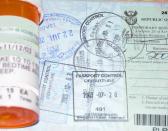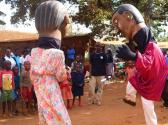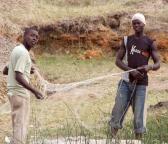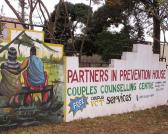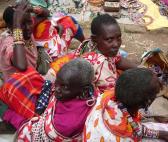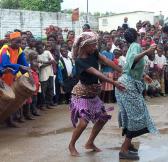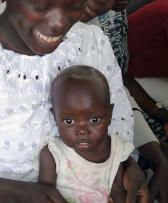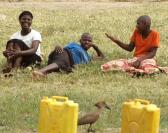Partners PrEP Study
Safe and effective approaches to preventing new HIV infections are urgently needed. An estimated 7,400 people a day are being infected with HIV, according to UNAIDS. More than 60 million people have been infected with HIV since the pandemic began. AIDS resulting from HIV infection is the leading cause of death in sub-Saharan Africa, and the fourth leading cause of death globally. Traditional prevention methods, including abstinence, being faithful to one sexual partner, and using condoms (the ABC's of HIV prevention), are well known; however, not everyone is able to use these methods all of the time.
Women are especially vulnerable. The majority of HIV infections in Africa occur among women. For many women, the current prevention methods are inadequate, since they often do not have the social or economic power to refuse sex or negotiate condom use. A vaccine against HIV is most likely more than 10 years away. Thus, new prevention strategies must be found.
There is scientific evidence that antiretroviral (anti-HIV) medications may be able to play an important role in reducing HIV risk. Two antiretroviral medications - tenofovir disoproxil fumarate ("tenofovir," also known by its brand name, Viread) and combination tenofovir/emtricitabine (this combination also known by its brand name, Truvada) - taken as daily preventive therapy, might substantially reduce the risk of HIV. This approach is known as pre-exposure prophylaxis, or PrEP:
- Pre - before
- Exposure - coming into contact with HIV
- Prophylaxis - taking medication to prevent becoming HIV infected
Several lines of evidence suggest that PrEP might work:
- The likelihood of transmitting HIV from mother to child can be halved or more with anti-HIV medications taken during pregnancy, delivery, and after birth.
- Anti-HIV medications can decrease the risk of an adult getting HIV after an accidental exposure to HIV - for example, a health care worker accidentally stuck by a needle.
- Animal studies have shown that PrEP, using tenofovir or the combination emtricitabine/tenofovir, substantially protects monkeys exposed repeatedly to an HIV-like virus.
Although these lines of evidence are very encouraging, we do not know for sure that PrEP works to prevent HIV infection in humans. That is why PrEP needs to be studied.
Study Description
ICRC is working with collaborators in Kenya and Uganda to study HIV discordant couples - that is, where one partner has HIV and the other does not have HIV. The partner who does not have HIV will take the anti-HIV medication daily. The objective of the study is to see whether having this medication in the bloodstream prevents the HIV uninfected partner from getting HIV. The study is currently enrolling participants.
A total of 4,700 HIV discordant couples will be enrolled at 9 clinical sites in Uganda and Kenya. The study is a randomized, double-blind placebo-controlled clinical study. The participants who are not HIV infected will be randomly divided into groups by a computer. All participants will take medication every day. Those from one group will take tenofovir, a second group will take the combination of emtricitabine and tenofovir, and the third group will take a placebo.
For more information:
- External Q&A
- Backgrounder
- Key Messages
- Press Release (UW, July 13, 2011)
- Press Release (UW, July 11, 2012)
Study Photos (Right-click the link and choose "Save Link As..." to download the photo)
- Photo 1 (Title: FTC/TDF pill; Credit: Partners PrEP Study Team)
- Photo 2 (Title: Partners PrEP Study site in Thika, Kenya; Credit: Jared Baeten, University of Washington)
Results
- Baeten JM, Donnell D, Ndase P, Mugo NR, Campbell JD, Wangisi J, Tappero JW, Bukusi EA, Cohen CR, Katabira E, Ronald A, Tumwesigye E, Were E, Fife KH, Kiarie J, Farquhar C, John-Stewart G, Kakia A, Odoyo J, Mucunguzi A, Nakku-Joloba E, Twesigye R, Ngure K, Apaka C, Tamooh H, Gabona F, Mujugira A, Panteleeff D, Thomas KK, Kidoguchi L, Krows M, Revall J, Morrison S, Haugen H, Emmanuel-Ogier M, Ondrejcek L, Coombs RW, Frenkel L, Hendrix C, Bumpus NN, Bangsberg D, Haberer JE, Stevens WS, Lingappa JR, Celum C for the Partners PrEP Study Team. Antiretroviral prophylaxis for HIV-1 prevention among heterosexual men and women. N Engl J Med. Published online 11 July 2012.
- Mujugira A, Baeten JM, Donnell D, Ndase P, Mugo NR, Barnes L, Campbell J, Wangisi J, Tappero J, Bukusi E, Cohen CR, Katabira E, Ronald A, Tumwesigye E, Were E, Fife K, Kiare J, Farquhar C, John-Stewart G, Kidoguchi L, Panteleeff D, Krows M, Shah H, Revall J, Morrison S, Ondrejcek L, Ingram C, Coombs RW, Lingappa JR, Becker S, Ridzon R, Celum C for the Partners PrEP Study Team. Characteristics of HIV-1 serodiscordant couples enrolled in a clinical trial of antiretroviral pre-exposure prophylaxis for HIV-1 prevention: The Partners PrEP Study. PLoS ONE. 2011;6(10): e25828. PMCID: 3187805.

